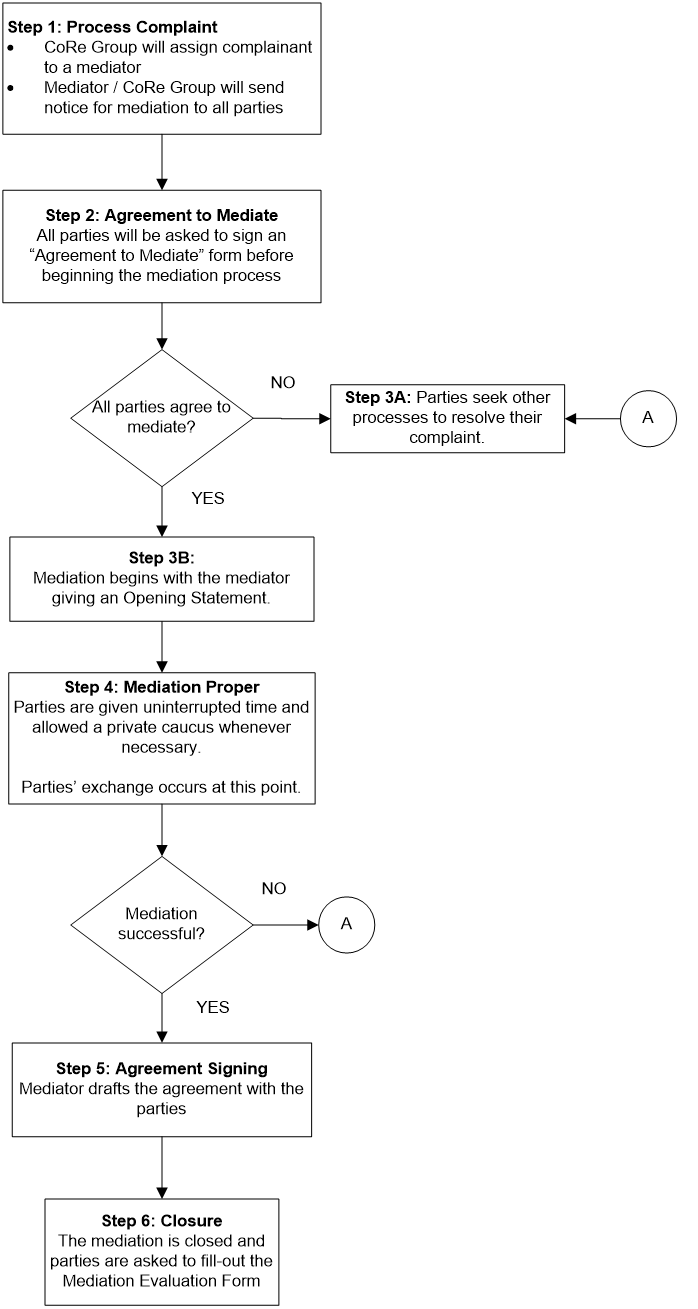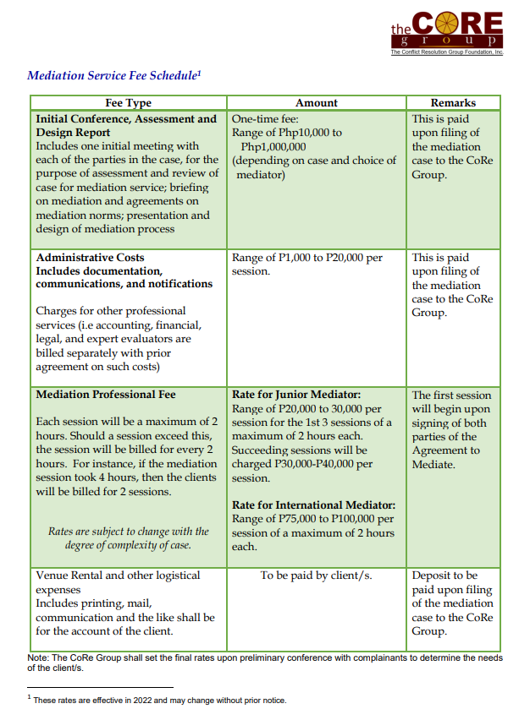Expanded FAQ on Mediation in the Philippines
1. What is mediation?
Mediation is a voluntary and confidential process where a neutral third party, called the mediator, helps people in conflict communicate and negotiate to reach an agreement. Unlike a judge or arbitrator, the mediator does not impose a decision. Instead, the solution comes from the parties themselves. This makes mediation flexible and empowering. It is especially effective in disputes where maintaining relationships is important, such as family, workplace, and community issues. In the Philippines, mediation is part of a broader push to resolve disputes outside court, saving time and resources while promoting collaboration.
2. Is mediation recognized in the Philippines?
Yes. Mediation is formally recognized under Republic Act 9285, or the Alternative Dispute Resolution (ADR) Act of 2004. The law promotes ADR mechanisms like mediation, conciliation, and arbitration as alternatives to litigation. Government agencies, courts, and accredited institutions like The Conflict Resolution Group Foundation (The CoRe Group) conduct mediation sessions. Court-annexed mediation is institutionalized by the Philippine judiciary, while agencies like the Department of Trade and Industry (DTI) and the Department of Environment and Natural Resources (DENR) also use mediation in their processes. This legal foundation ensures that mediation is not just an informal option but a legitimate and enforceable process.
3. What types of cases can be mediated?
Mediation in the Philippines applies to a wide variety of disputes:
Consumer complaints (e.g., defective goods, poor service) handled by agencies like DTI.
Family disputes, such as inheritance, support, or parenting arrangements.
Workplace conflicts including termination, performance disputes, or interpersonal issues.
Commercial and contractual disagreements, especially among SMEs.
Community disputes such as land use, environmental concerns, or barangay-level conflicts.
Specialized disputes like construction contracts, insurance, or renewable energy projects.
Certain cases, like those involving serious criminal offenses, cannot be mediated. Still, the range of mediable disputes continues to expand as agencies and communities recognize its value.
4. How long does mediation take?
Most mediation cases are resolved within one to three sessions, usually lasting two to four hours each. This means disputes can often be settled within weeks, compared to months or years in litigation. Complex cases may require more time, but mediation is still significantly faster. For example, a consumer complaint about a defective appliance can be resolved in a single DTI mediation session, while a workplace grievance may take two or three meetings. The speed of mediation is one of its greatest advantages in the Philippine context, where court cases often face backlogs.
5. Is mediation legally binding?
Yes, if the parties reach an agreement, the outcome is written in a settlement agreement and signed by all parties. This document has legal weight. Under RA 9285, a mediated settlement agreement can be submitted to the appropriate court or agency for confirmation, making it enforceable like a court judgment. In practice, this means that once the parties agree, they are legally obligated to follow the terms. If one party refuses to comply, the other can enforce the settlement through the proper legal channels.
6. How much does mediation cost?
Mediation is generally less expensive than litigation. In the Philippines:
Barangay mediation under the Katarungang Pambarangay is free.
DTI consumer mediation is also free of charge.
Court-annexed mediation charges minimal fees, usually a few thousand pesos.
Private mediation services may have professional fees, typically shared between the parties, but these are still lower than lawyer’s fees for prolonged litigation.
The affordability of mediation makes it accessible to ordinary Filipinos and small businesses alike.
7. What happens if mediation fails?
If mediation does not lead to an agreement, the parties remain free to pursue other remedies, such as arbitration, court litigation, or negotiation. Importantly, discussions in mediation are confidential and cannot be used against either party in future proceedings. Even if mediation fails, it often clarifies the issues and reduces hostility, which can make subsequent processes more efficient. In many cases, mediation narrows the dispute to fewer issues, saving time and resources in the long run.
8. What are the advantages of mediation compared to going to court?
Mediation offers multiple advantages:
Speed: disputes are resolved in weeks, not years.
Lower cost: mediation avoids expensive legal fees.
Confidentiality: the process is private.
Control: the parties—not a judge—decide the outcome.
Preservation of relationships: mediation reduces hostility and promotes understanding.
In a society like the Philippines where personal and business relationships are deeply valued, these advantages make mediation especially relevant.
9. Do I need a lawyer in mediation?
No, lawyers are not required. Many parties attend mediation without legal representation, especially in barangay or consumer disputes. However, parties may bring lawyers if they wish, particularly for commercial cases or when legal advice is necessary. Lawyers in mediation act as advisers, not as litigators. The process is designed to be accessible even to individuals without legal training. Take note of mediation centers that do not allow legal counsel to be present during the mediation session.
10. Who provides mediation services in the Philippines?
Mediation services are offered through multiple channels:
Barangay Justice System (Katarungang Pambarangay).
Court-Annexed Mediation managed by the Philippine judiciary.
Government agencies like DTI, DENR, and NCIP.
Accredited institutions such as The Conflict Resolution Group Foundation (CoRe).
Private mediators accredited by the Office for Alternative Dispute Resolution (OADR).
This multi-level system ensures that mediation is available in both grassroots and formal legal contexts.
11. Can mediation be done online in the Philippines?
Yes. Since the COVID-19 pandemic, online mediation (or e-mediation) has become common. Parties meet through secure video conferencing platforms, allowing disputes to be resolved even when participants are in different locations. The Supreme Court of the Philippines has allowed online mediation in certain cases, and agencies like DTI also conduct mediation virtually. This expansion increases accessibility, particularly for parties in rural or overseas locations.
12. What is the role of the mediator?
The mediator’s role is to facilitate communication between parties. The mediator helps clarify issues, manage emotions, and encourage problem-solving. Mediators do not judge, take sides, or impose decisions. Instead, they guide parties through a structured process, helping them explore underlying interests and possible solutions. In values-based mediation, which The CoRe Group champions, mediators also help parties reconnect with their core values to find more meaningful resolutions.
13. How is mediation different from conciliation, arbitration, or litigation?
Mediation: Parties decide the outcome with the mediator’s help.
Conciliation: Similar to mediation, but the conciliator may propose solutions.
Arbitration: An arbitrator issues a binding decision, like a private judge.
Litigation: A court judge decides the case in a formal trial.
Mediation is the most collaborative and flexible, making it suitable for parties who want to preserve relationships.
14. What is values-based mediation?
Values-based mediation goes beyond surface-level compromise. It focuses on uncovering the underlying values and needs driving each party’s position. For example, a workplace dispute over “office hours” may actually be about respect, recognition, or work-life balance. By identifying these deeper values, solutions become more sustainable and satisfying. The CoRe Group has pioneered values-based mediation in the Philippines, training mediators to apply this approach.
15. What is the role of barangay mediation?
Under the Katarungang Pambarangay Law, most disputes between neighbors, family, or small community members must first go through barangay mediation before they can be filed in court. Barangay captains and the Lupong Tagapamayapa facilitate these sessions. This system reflects Filipino culture, which values community-based dispute resolution. Barangay mediation unclogs courts and promotes harmony at the grassroots level.
16. Is mediation mandatory before filing in court?
For many disputes, yes. In barangay cases, parties cannot go directly to court without a certification from the barangay that mediation was attempted. In commercial and civil cases, the Supreme Court requires Court-Annexed Mediation before trial. The idea is to encourage settlement first, and resort to litigation only if mediation fails.
17. What makes mediation successful?
Successful mediation requires three elements:
Willing parties open to dialogue.
A skilled mediator who can manage emotions and guide communication.
A safe environment where parties can speak freely.
Research and experience in the Philippines show that when these conditions are met, the majority of cases are settled amicably. The success rate of mediation is consistently high, especially in consumer and workplace disputes.
18. How is confidentiality protected in mediation?
Under RA 9285, everything discussed in mediation is strictly confidential. Mediators and parties cannot disclose what was said, and records cannot be used as evidence in court, except in very limited circumstances (like proving fraud). This rule encourages parties to speak openly without fear of damaging their case later.
19. How is mediation used in business and community projects?
Mediation is increasingly used in infrastructure and renewable energy projects in the Philippines. For example, disputes between local communities and developers over land use, compensation, or environmental impact are often addressed through mediation and dialogue facilitation. By preventing conflicts from escalating, mediation helps ensure that projects move forward while respecting the rights of stakeholders.
20. Is Philippine mediation recognized internationally?
Yes. Philippine mediation practices align with international standards developed by the United Nations Commission on International Trade Law (UNCITRAL), which issued the UNCITRAL Model Law on International Commercial Conciliation. RA 9285 (the ADR Act of 2004) was heavily influenced by this model law, ensuring that the Philippine system is consistent with global best practices.
In 2019, the Philippines also signed the Singapore Convention on Mediation (officially the “United Nations Convention on International Settlement Agreements Resulting from Mediation”), which provides a framework for enforcing cross-border mediated settlement agreements in other signatory states.
It is important to note that the New York Convention (1958) applies to arbitration awards, not mediation. However, mediation’s counterpart is now the Singapore Convention, which plays a similar role in giving international enforceability to mediated settlements.
For businesses, this means that mediation in the Philippines is not only legally recognized domestically but also carries weight in the international arena, particularly for cross-border commercial disputes.
21. How does the enforcement of mediation settlements differ from arbitration awards internationally?
Arbitration and mediation are both recognized worldwide, but their enforceability mechanisms are different.
Arbitration: International arbitration awards are enforced under the 1958 New York Convention, which has more than 170 signatory countries. This means that if you obtain an arbitral award in the Philippines, it can generally be enforced abroad in any other signatory state, and vice versa.
Mediation: For a long time, mediated settlement agreements lacked a similar global enforcement framework. This changed with the 2019 Singapore Convention on Mediation, which the Philippines has signed. The Convention allows mediated settlement agreements to be directly recognized and enforced across borders, much like arbitration awards under the New York Convention.
Key Difference: Arbitration results in a decision made by a third party (arbitrator), while mediation results in a voluntary settlement agreement crafted by the parties themselves. The Singapore Convention ensures that such voluntary agreements can no longer be ignored in international commerce.
For businesses and investors, this dual framework means they can choose the process best suited to their needs: arbitration for binding third-party decisions, or mediation for collaborative settlements that now have global enforceability.
Conclusion
Mediation in the Philippines is more than just an alternative to court. It is a culturally rooted, legally recognized, and increasingly practical way of resolving disputes. With RA 9285 providing a strong foundation, mediation now serves individuals, families, businesses, and communities. Whether through barangay justice, court-annexed mediation, or values-based approaches pioneered by institutions like CoRe, mediation empowers people to take control of their conflicts and create lasting solutions.




